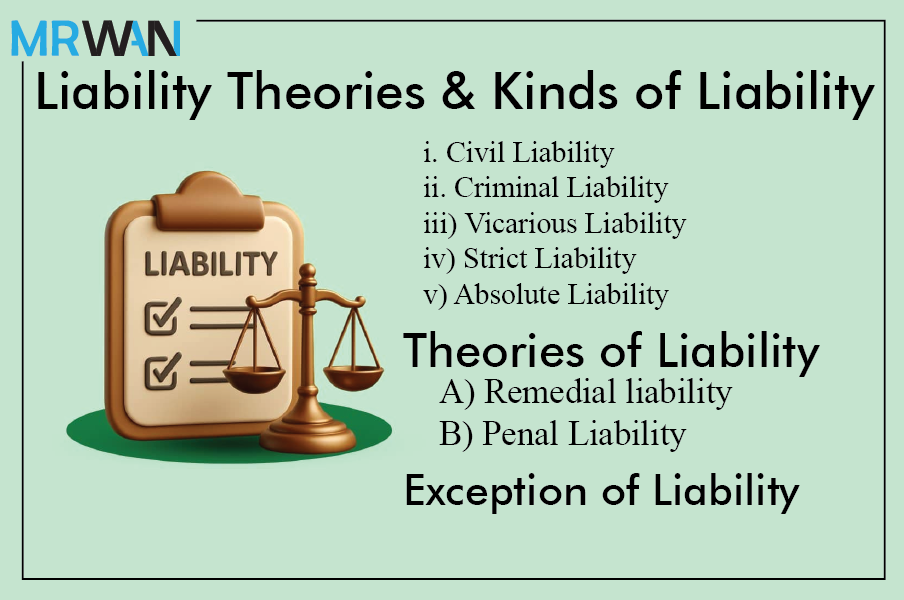Liability
When a person violates the right of another or does not perform his duty with respect to another. The wrong is committed and therefore, liability arises. Liability is the remedy for wrongs. Where there are wrongs committed, the liabilities arise. Thus, a person committing wrong is liable or responsible for it.
Various Jurists have given various different definitions of the term “Liability”. “Liability or responsibility is the bond of necessity that exists between the wrongdoer and the remedy of wrong”. – Salmond
“Liability is the condition of a person who has duty to perform”. – Mark by
Kinds of Liability
Civil Liability
Civil Liability arises when civil (private) rights are violated.
For e.g. – Non performance of contract.
How to measure civil liability?
It means how much liability falls upon the person who violates his duty. It depends upon the nature of contract or nature of wrong.
Criminal Liability
Criminal liability arises when public rights are violated that affect the whole society at large.
For e.g. – If A kills B.
If A has committed rape (grevious offence) of B, a minor child. Such offence does not only affect B but the whole society.
How to measure criminal liability?
There are three ways to measure it : –
Motive of the offence
The motive of the wrongdoer is seen behind the wrong. If his motive is intense, the severe punishment is given.
For e.g. if one had motive to kill anyone. The punishment would be capital punishment.
Whereas, motive sometimes provides leniency to wrongdoer when he is compelled by circumstances to commit wrong. For e.g. If a person steals food to eat as he was hungry, then he may get some lenience.
Magnitude of the offence
How much profit a wrongdoer gets by committing wrong is seen here.
If he gets more profit, more intense punishment will be given.
Character of the offender
The character of the offender is seen. If he has already criminal antecedent or record/history. The more severe punishment is given.
iii) Vicarious Liability
When one is held responsible for the wrongs of others.
For e.g – A master is responsible for his servant if the act is committed within the course of his emplyement.
Similarly the relationship of principle and its agent is also governed by the vicarious liability.
iv) Strict Liability
It is general principle that a person who is negligent shall be answerable for his negligence. And a person who acts like a prudent man is never answerable for act done by him.
In Ryland v. Fletcher case for first time (1868) an exception to this is introduced. This is known as rule of strict liability. This liability may be fixed without negligence.
v) Absolute Liability
In M.C. Mehta v. Union of India, The rule of ‘strict liability’ though is ‘strict’; there are some exceptions to it whereby defendant could avoid his liability.
But rule of ‘absolute liability’ which is evolved in M.C. Mehta v. Union of India leaves no defense to defendant, making him absolutely liable. In this regard two cases i.e. Bhopal Gas Disaster Case and M.C. Mehta v. Union of India are important. RULE OF ABSOLUTE LIABILITY
Theories of Liability
A) Remedial liability
It is based on a legal maxim; “ubi jus ibi remedium” which means where there is a right, there is a remedy. It is more of a specific performance.
For e.g. if a person takes loan and refuses to pay, he may be compelled to repay it.
Exception – Imperfect obligation, Incapable of specific performance and Specific performance being inexpedient.
B) Penal Liability
This theory is concerned with punishment of wrong. It is based on the maxim “actus non facit reum, nisi mens sit rea”, which means “the act alone does not amount to guilt, it must be accompanied with guilty mind”.
Exceptions – Sedition, Kidnapping, Abduction, offences against the state, etc.
Different between Remedy and compensation
There is difference between Remedy and compensation. Remedy is given by person and Compensation is given by courts.
Exception of Liability:
- There are four exception of liability
- Duties of imperfect obligations
- incapable of enforcement.
- Specific performance of duty in expedient.
For latest articles join our WhatsApp channel
https://whatsapp.com/channel/0029Vb5y4EqInlqKkZGCI630

